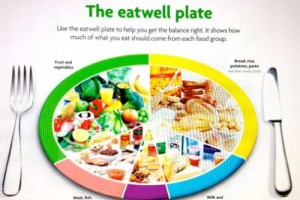Introduction to Healthy Eating 
In today’s fast-paced world, where convenience often takes precedence over health, maintaining a balanced diet is more crucial than ever. Healthy eating isn’t just about restricting calories or following fad diets; it’s about nourishing your body with the nutrients it needs to thrive.
Physical Health Benefits
One of the most noticeable benefits of eating healthy is the positive impact it has on physical health. By consuming a balanced diet rich in fruits, vegetables, lean proteins, and whole grains, individuals can manage their weight effectively. Moreover, adopting healthy eating habits significantly reduces the risk of chronic diseases such as heart disease, diabetes, and certain cancers. Additionally, a nutritious diet strengthens the immune system, helping the body fight off infections and illnesses more effectively.
Mental Health Benefits
In addition to promoting physical well-being, healthy eating habits are closely linked to mental health. Studies have shown that consuming nutrient-dense foods can improve mood and overall mental well-being. Individuals who prioritize healthy eating are less likely to experience symptoms of depression and anxiety. Furthermore, a balanced diet supports cognitive function, enhancing memory, concentration, and overall brain health.
Increased Energy Levels
Nutritious foods serve as the body’s primary source of energy, providing a steady supply of fuel throughout the day. Unlike processed foods high in sugar and unhealthy fats, which often lead to energy crashes, whole foods sustain energy levels and promote alertness and productivity.
Improved Digestive Health
A diet rich in fiber from fruits, vegetables, and whole grains is essential for maintaining optimal digestive health. Fiber aids in digestion, prevents constipation, and supports a healthy gut microbiome. By incorporating fiber-rich foods into their diet, individuals can promote regularity and prevent digestive issues.
Better Skin Health
The saying “you are what you eat” holds true when it comes to skin health. Nutrient-rich foods such as fruits, vegetables, and omega-3 fatty acids contribute to a clear complexion and youthful appearance. These foods provide essential vitamins and antioxidants that protect the skin from damage and promote collagen production.
Enhanced Sleep Quality
The foods we consume play a significant role in our sleep patterns. Certain foods, such as those high in tryptophan and magnesium, promote relaxation and improve sleep quality. By incorporating these foods into their diet, individuals can enjoy better sleep and wake up feeling refreshed and rejuvenated.
Boosted Longevity
Healthy eating habits are closely associated with increased longevity. Studies have shown that individuals who follow a balanced diet and maintain a healthy weight are more likely to live longer, healthier lives. By prioritizing nutritious foods and regular physical activity, individuals can enhance their overall quality of life and extend their lifespan.
Cost-Effective Benefits
While the initial cost of healthy foods may seem higher than processed alternatives, investing in a nutritious diet can lead to long-term savings on healthcare costs. By preventing chronic diseases and reducing the need for medical interventions, healthy eating ultimately saves individuals money in the long run.
Environmental Benefits
In addition to benefiting personal health, healthy eating choices have positive implications for the environment. Sustainable food choices, such as consuming locally grown produce and reducing meat consumption, help conserve natural resources and reduce greenhouse gas emissions.
Improved Productivity
The foods we eat directly impact brain function and cognitive performance. Nutrient-rich foods, including fruits, vegetables, and whole grains, provide the vitamins and minerals necessary for optimal brain health. By fueling their bodies with nutritious foods, individuals can enhance focus, concentration, and productivity throughout the day.
Social Benefits
Healthy eating habits can also have social benefits, as they often involve sharing meals and experiences with loved ones. By promoting healthy habits within social circles, individuals can inspire others to prioritize their health and well-being.
Educational Opportunities
Nutrition education plays a crucial role in empowering individuals to make informed choices about their diet and lifestyle. By understanding the importance of nutrition and adopting healthy eating habits early on, individuals can access better educational and professional opportunities.
Self-Confidence and Body Image
Maintaining a healthy diet can positively impact self-esteem and body image. When individuals nourish their bodies with nutritious foods, they feel better both physically and mentally, leading to increased self-confidence and a more positive body image perception.

Conclusion
In conclusion, the benefits of eating healthy extend far beyond weight management and physical health. From improved mental well-being to increased longevity and enhanced productivity, prioritizing nutritious foods has numerous positive effects on overall health and quality of life. By making conscious choices to eat a balanced diet rich in fruits, vegetables, lean proteins, and whole grains, individuals can enjoy a multitude of benefits that contribute to a happier, healthier lifestyle.



